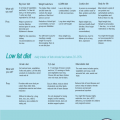Thinking is hard work. This is why so few people bother. At least voluntarily. So whenever it seems like the threat of brainwork looms in modern American medicine, we can thank our lucky stars for the geniuses behind healthcare “reform” and guidelines of care.
 This comes up as a result of a conversation that I had with a patient the other day. A pleasant, obese gentleman. He had been struggling with his weight and Type II diabetes for some time, and there were now some early indications of some potentially serious long-term complications. He mentioned to me that he was working hard to prepare for gastric bypass surgery. I asked him how he was doing that.
This comes up as a result of a conversation that I had with a patient the other day. A pleasant, obese gentleman. He had been struggling with his weight and Type II diabetes for some time, and there were now some early indications of some potentially serious long-term complications. He mentioned to me that he was working hard to prepare for gastric bypass surgery. I asked him how he was doing that.
“Why, by eating!” he replied. Huh? By eating?
“Oh yes”, he explained. “You see, I’m getting these complications from my weight and diabetes and all of my doctors think that I’m an excellent candidate for weight loss surgery. Based on my previous weights, if I can just get lose about 40 or 50 pounds, I should have much better blood sugars and need far less insulin. God, that stuff is expensive when you’re using hundreds of units per day!”
That sounded perfectly reasonable. This gentleman is a walking advertisement for the virtues of slimming down. And for gastric bypass, in fact. So why is he holding that venti whole milk mocha with 508 calories and 27 grams of fat?
“Oh, this?” He looked a bit sheepish. “Well the problem is that the surgeons won’t operate on me yet because I don’t quite fit the guidelines they have to follow for doing the operation. Insurance won’t cover the surgery until I reach a BMI [body mass index] of 40, and I’m a couple of pounds short. So I have to gain the weight and have them document that I’ve reached the magic number. Then I’ll actually lose the weight again when they put me on the special post-surgery diet to make sure that I can tolerate it. If all of that works out okay, then they’ll schedule the surgery.”
Now I realize that I’m revealing some age here, but in the old days we would have looked at the patient, considered his history, physical condition, social situation and medical compliance, and decided whether the surgery was indicated and likely to be beneficial based upon all of those things. He doesn’t quite meet the BMI criteria established by some study? Well so what? He’s a good candidate. Let’s do it. And we would. And lo, the patient would usually get better because we wanted to pick good candidates and have them succeed. That was our job. We were the medical experts and we were being paid to think. Besides, if someone else knew way more about medicine and our patients than we did, why weren’t they the ones taking care of them instead of us?
But of course then we’d have to use our heads. Thank God those days are over. Now if the patient’s vital statistics don’t match whatever the insurer’s guideline computer tells the high school graduate who happens to be denying authorizations that day, then you’d best go away and come back when they do. No use fretting about it. You’ll never make it through the insurer’s phone trees or get a reply to your voice mails asking to speak to a medical director anyway.
I wished our patient luck, and later brought up the case with the doctor who was taking care of his diabetes. He was visibly exasperated about the whole ordeal.
“We’ve been working very hard on his diabetic control.”, she said. “He’s been pretty good about his diet, but has one of those bodies that really uses energy efficiently. It just hangs on to every ounce of weight. We had his hemoglobin A1c down to 7% (Ed. note: normal is 4% to 6%), but since he’s had to start gaining weight it’s back up to 7.9%. I’ll be glad when this whole ordeal is over and we can go back to treating his disease rather than the damned guidelines.”
Silly doctor. Why would you want to do that? You’ll have to think. Besides, wake up and smell the mocha. You’re being paid to follow the guidelines.
Hellth, anyone?













